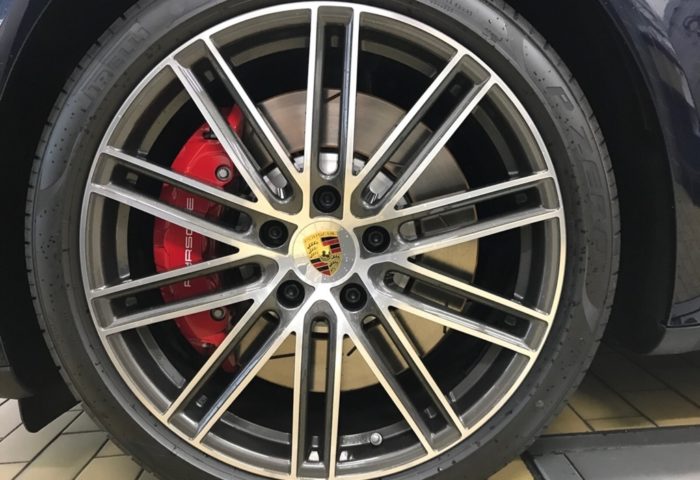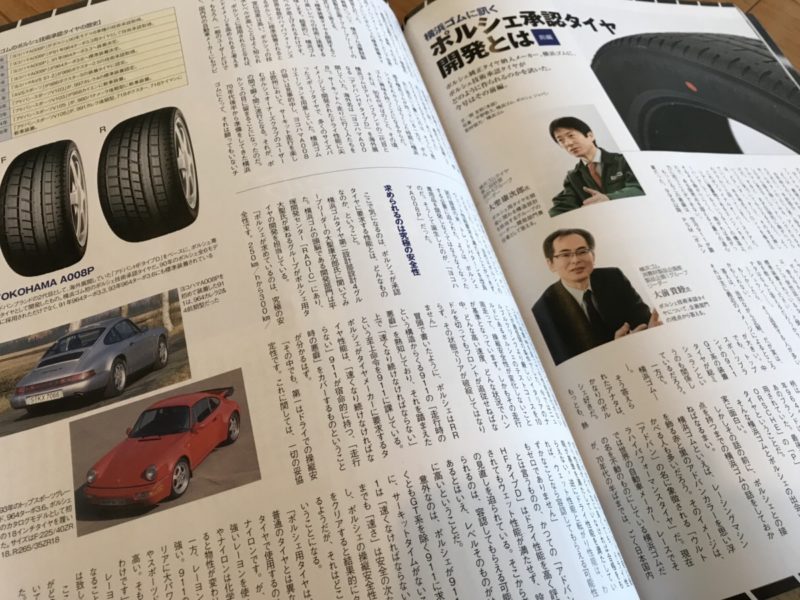Meaning of the “N (Number)” on Porsche Certified Tires and Behind the Scenes of Approved Tire Development
公開日:2018.09.18

The “N○” on Porsche Certified Tires
The other day, while researching certified tires for the Panamera on Porsche Japan’s official site, I noticed something interesting in the specs column next to the tire names: notations like “N0, N1, N2, N3, N4”.

I learned that “N” stands for the German word “NORM” (standard, regulation, norm), indicating certification, but what does the number next to the N mean? Checking Porsche Japan’s official “Porsche N Mark” page, it says:
All tires available through Porsche authorized dealers and Porsche Service Advisors undergo rigorous testing and receive Porsche certification. This is identified by the N mark, abbreviated as N0, N1, N2, N3, N4, N5, and N6 in the tire’s technical data. These abbreviations indicate the technical status at the time of certification, with the numbers increasing sequentially.
Hmm, I kind of get it, but not quite… (-_-)
After digging a bit more, I found out that the number next to the N indicates which generation of certification the tire series belongs to. The first certified tire is labeled “N0,” and whenever the tire model is updated and re-certified, the number increases to N1, N2, N3, and so on.
So, even tires of the same size and model can have different N numbers. For example, as shown in the image below, the same 19-inch Pirelli P-Zero tire comes in both N0 and N1 versions.

In this case, a higher number like “N1” means the tire has been re-certified following a model update, so it’s a higher-performance tire. Tire prices also tend to be slightly higher for the versions with bigger numbers.
An Article from 911DAYS
I thought, “It must be really tough to keep being a Porsche certified tire every time the model changes.” Then my husband found a special feature in the Porsche magazine “911DAYS vol.68.”
Interview with Yokohama Rubber: The Development of Porsche Approved Tires “Part 1”
We asked Yokohama Rubber, the official Porsche tire supplier, how Porsche-approved tires are developed. This is the first part.
Oh… this sounds intriguing ( ̄ー ̄)!
So, I’d like to share some of what was written there.
Words from the Yokohama Rubber Representative
While Michelin is often associated with Porsche’s standard tires, Yokohama Rubber has been supplying tires since the 964 Carrera era. Currently, Yokohama tires are still used on the 991 Carrera late model, 718 Boxster, and Cayman.
It’s a well-known fact that Porsche is tough on tire manufacturers. The 911’s rear-engine, rear-drive layout causes strong oversteer and understeer characteristics during driving. Yet, to pursue “speed” and “safety” to the extreme, Porsche places very strict demands on tire makers.

So, what kind of performance does Porsche require from approved tires?
Porsche demands “ultimate safety.” Tires must maintain consistent handling safety even when driven continuously at speeds between 250 km/h and 300 km/h. Specifically, they must show no performance degradation after two full laps (over 40 km) at full throttle on Germany’s Nürburgring, or after 10 laps on Porsche’s test track in Nardo, Italy, which is even more demanding than the Nürburgring.
Moreover, during these runs, no matter how fast or under what conditions the steering wheel is turned, the front tires must follow precisely and the rear tires must not lose grip.
Dry Handling Stability Is the Most Important
Among all requirements, the most critical is “handling stability on dry roads.” Wet performance and rolling resistance are only considered after the dry performance standards are met.
Surprisingly, Porsche does not include circuit lap times as a requirement for 911 tires (excluding GT models). While the 911 must be fast, safety is more important. Also, if a tire meets Porsche’s handling stability standards, it naturally results in faster lap times.
What Materials Are Used in the Tires?
The materials used in Porsche-approved tires differ from those in regular tires. While typical tires use polyester or nylon, Porsche-approved tires use heat-resistant rayon. Polyester and nylon are synthetic materials that eventually melt at high temperatures, but rayon is a natural fiber that withstands heat better.
In the case of the 911, the rear tires endure high power loads during high-speed and sporty driving, causing the tires to heat up easily. To maintain maximum handling stability, the material must be rayon. Although rayon is more expensive, it’s necessary to enhance tire performance.
Wow, this is impressive. I always admire companies like Porsche and Yokohama Rubber for their craftsmanship. I tend to be a bit casual, so if something is 70-80% done, I’d probably say, “That’s good enough,” but their relentless pursuit of perfection is truly admirable.
This issue of “911DAYS” also contains many other fascinating articles, so I look forward to reading it thoroughly when I find the time.
このブログが気に入ったらフォローしてね!



Comment ( 0 )
Trackbacks are closed.
No comments yet.